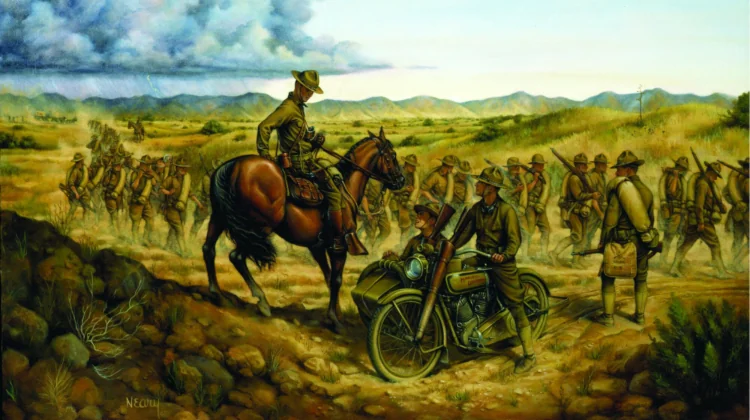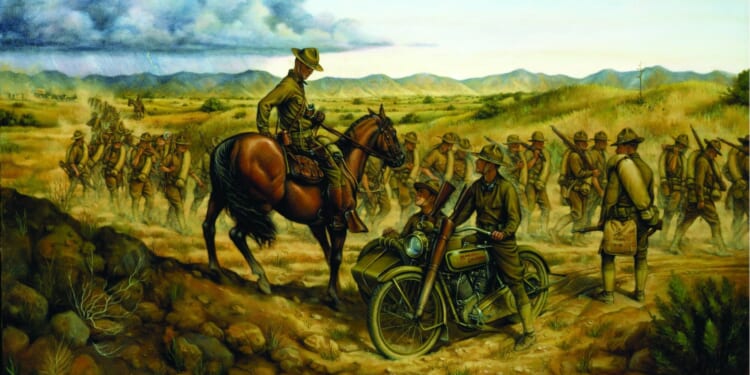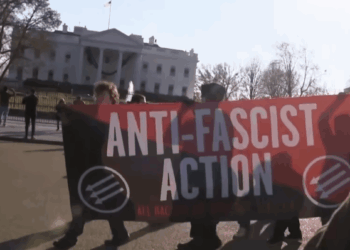
Order Michael Finch’s new book, A Time to Stand: HERE. Prof. Jason Hill calls it “an aesthetic and political tour de force.”
Sign up to attend Michael’s talk in Los Angeles on Thursday, November 20: HERE.
In the predawn hours of March 9, 1916, more than 500 men under Pancho Villa crossed from Mexico into Columbus, New Mexico. They burned homes and shops, looted supplies, and killed eighteen Americans—ten civilians and eight soldiers. The outrage was instantaneous. President Woodrow Wilson ordered a full-scale punitive expedition into Mexico under Brig. Gen. John J. Pershing.
Pershing led nearly 10,000 troops hundreds of miles into Chihuahua. The campaign lasted almost a year and even featured a young lieutenant named George S. Patton, who conducted one of the first motorized assaults in U.S. history. Dozens of Villa’s lieutenants were killed or captured—many executed by Mexican authorities. Villa himself escaped, but the message was unmistakable: an attack on American soil would be answered with overwhelming force. There were diplomatic protests, but few lectures about “proportionality.” The moral assumption was clear: a sovereign nation must have the freedom to hunt down its attackers and end the threat, whatever it takes.
Fast-forward to October 7, 2023. Hamas terrorists poured across the Gaza border, murdering roughly 1,200 Israelis in a single day. The attacks were sadistic beyond comprehension—families burned alive, women raped, infants beheaded, the elderly mutilated. Hundreds of civilians were dragged into Gaza as hostages, along with the corpses of the dead. Many remain there today, their captivity and desecration used as psychological warfare against an entire nation.
To grasp the scale, imagine the United States suffering an equivalent loss: 40,000 Americans killed in one morning—a national trauma twenty times worse than 9/11. Yet while the United States in 1916 sent an army across the border to punish Villa, modern Israel has been told again and again to restrain itself.
From the first week of the Gaza war, Israel has faced an unrelenting chorus of foreign pressure for “cease-fires” and “humanitarian pauses.” Every time its forces press their advantage, calls arise to halt operations, allow resupply of Gaza, and return to the status quo that produced October 7 in the first place. And unlike any country in history, Israel has been compelled not only to fight its enemies but to feed and sustain them in real time.
Each day, hundreds of truckloads of food, fuel, and medicine cross from Israel into Gaza—even as Hamas fires rockets from the same territory. It is not merely that these supplies benefit civilians caught in the crossfire; they also keep the very regime that carried out the massacre alive. What makes it worse is that the population itself overwhelmingly supports Hamas. Polls show that upward of 90–95 percent of Gazans endorsed the October 7 attack or celebrated it openly, calling for its repetition. There has been no mass apology, no collective reckoning, no moral horror—only pride and defiance.
So Israel is compelled to feed, fuel, and resupply a population that still glorifies its murderers and would repeat their crimes tomorrow if given the chance. There is no precedent in the annals of war for a nation required to provision an enemy population that both supports and shelters those who slaughtered its people.
Worse still, Israel has been denied one of the oldest and most basic tools of warfare: siege. In every era, a besieged city that launches war against its neighbor could expect its power, water, and supplies to be cut off until surrender. Yet Israel has been forced to do the opposite—to restore water, fuel, and electricity to Gaza even while its own citizens sit in darkness in border towns still under rocket fire.
This is not because Hamas lacked the means to provide for its own people. For years it diverted billions of dollars in foreign aid and materials not to building water systems, power plants, or hospitals, but to constructing an underground empire of attack tunnels, bunkers, and weapons depots. Gaza could have been Dubai; Hamas chose to make it Dresden. The billions that could have lit schools and powered hospitals instead built a fortress for genocide.
The contrast with Pershing’s expedition could not be starker. The United States, attacked by a few hundred raiders in 1916, pursued them across a foreign border without apology. Israel, after enduring the worst massacre of Jews since the Holocaust, is told it must fight with one hand tied behind its back and the other feeding the enemy.
Moral concern for civilian life is right and necessary. But moral paralysis that rewards aggression is not compassion—it is complicity. Every forced pause, every convoy of “humanitarian aid,” allows Hamas to regroup, rearm, and re-emerge from its tunnels. The same world that once applauded America’s determination to punish a cross-border attack now condemns Israel for doing the same thing more carefully and more justly.
Pershing never caught Pancho Villa, but his campaign re-established deterrence: for years, the border was quiet. If Israel is prevented from finishing its mission, deterrence will collapse and October 7 will only repeat itself in new forms. The lesson from 1916 is not that war is clean or easy—it’s that unfinished wars always return.
A century ago, the United States understood that truth. It accepted the risks, the casualties, and the diplomatic fallout that come with decisive self-defense. Today it scolds its closest ally for doing what it once did instinctively. If America wishes to honor its own legacy, it should remember that Pershing’s pursuit into Mexico was not a crime but an assertion of national sanity.
Israel deserves that same right—the right every free nation must have—to defend itself without apology, to finish what must be finished, and to ensure that those who slaughter its people never get the chance to do it again.
Baruch Hashem is a pseudonym for a filmmaker, writer, and philosopher based in Beverly Hills, currently developing essays on history, politics, and moral clarity for a world gone mad.

















